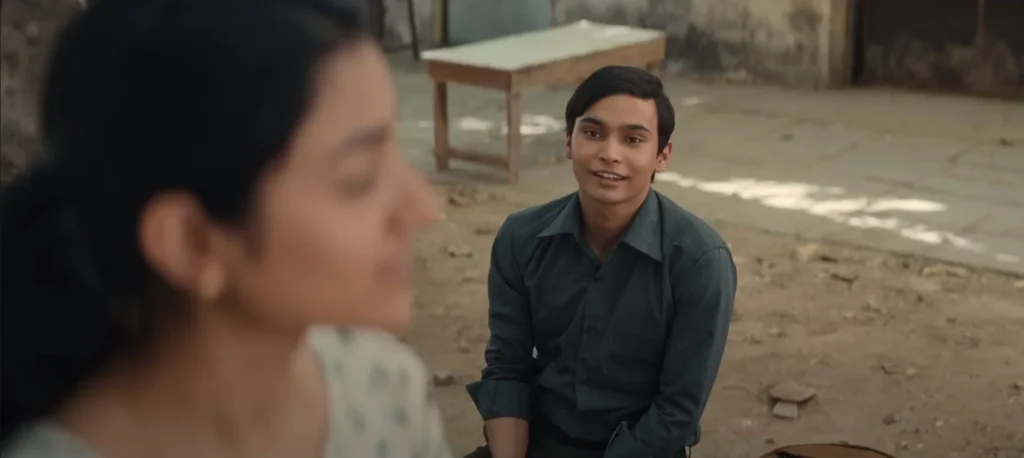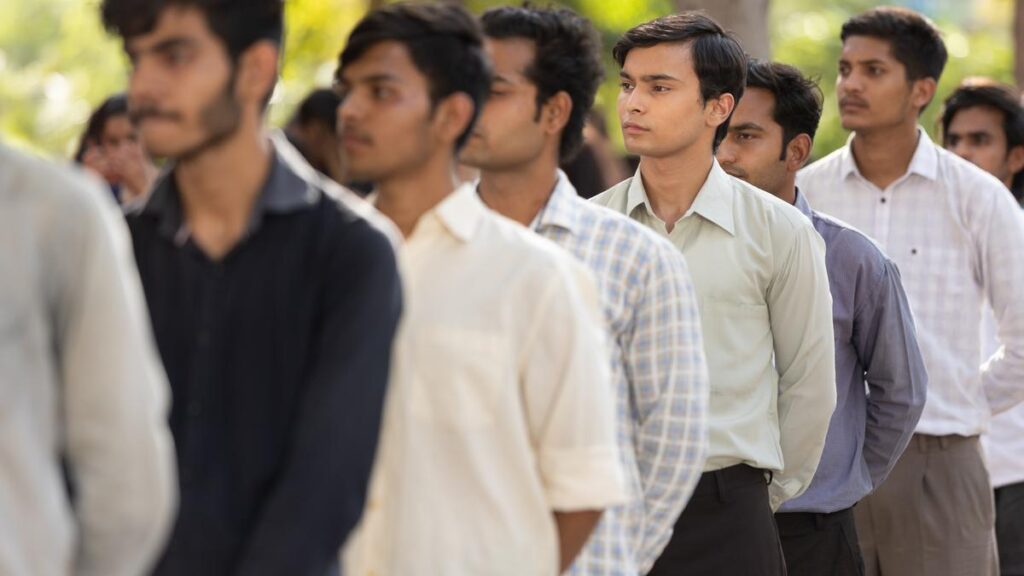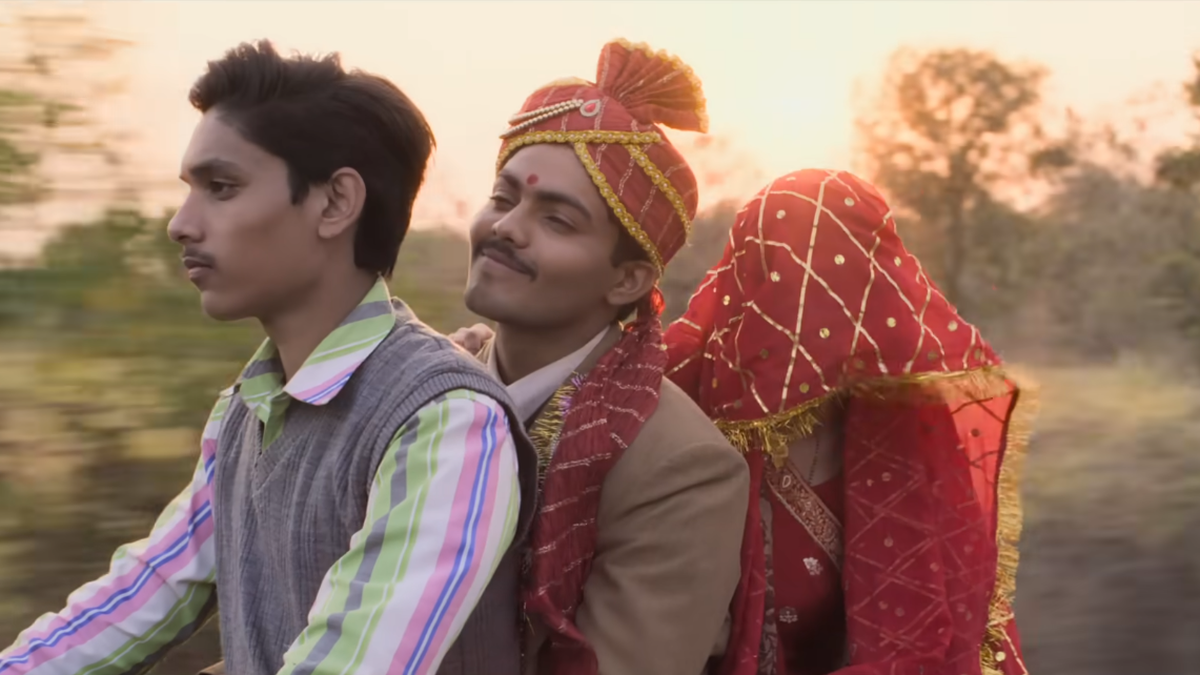Living up to the expectations of our parents and fulfilling their dreams has been an important component of Indian society since time immemorial. It has almost taken the form of a ritual that has been passed from one generation to the next, especially in a typical middle-class family where options to earn social status are limited. The protagonist of screenwriter, lyricist, and stand-up comedian Varun Grover‘s debut feature film, All India Rank, is an adolescent who is crushed under pressure from his parents to academically excel at the IIT exam and subsequently earn a reputation in society. His parents are worried about their child’s future and display concern. But their anticipation has put much strain on the young soul. But soon, the grueling journey provides him with an avenue to discover his identity and embrace the challenges that come with it. The film delves into the themes of the complexities of family dynamics, societal pressure, and the quest for self-discovery with a gracefulness that makes this coming-of-age tale relatable to a large extent.
Set in the year 1997, seventeen-year-old Vivek’s (Bodhisattva Sharma) father, RK Singh (Shashi Bhusan), sends him from their hometown in Lucknow to Kota to prepare for the upcoming IIT entrance exam. Singh, a low-ranking officer in the telecom department, holds the belief that those who graduate from the prestigious institute are highly cultivated. Vivek joins the Bundela coaching center, helmed by Bundela M’am (Sheeba Chaddha), and begins living in a hostel. Overcoming his shyness, he befriends Chandan (Neeraj Singh) and Rinku ( Ayush Pandey), who have been laboriously preparing for the exam for three years. Meanwhile, back in Lucknow, Singh’s position in office suffers as he makes a horrendous mistake during his office’s annual function on the 50th Independence Day. Now, he pins all his hopes on Vivek to restore his standing in society. As Vivek struggles with the intense preparation for the exam, his stress mounts. He also develops feelings for his classmate Sarika (Samta Sudiksha), and the sentiment is mutual. Now, how Vivek overcomes the academic and emotional challenges becomes the crux of the film.

As the film begins, Vivek’s voiceover reveals that his father has sent him for coaching so that he can control his life. Sharma, who works in an office, faces exploitation from his superiors due to his position. Vivek’s mother, Manju (Geeta Agarwal), runs a PCO and struggles with high cholesterol due to her excessive consumption of sweets. Moreover, she could even control the manners of a perverted young boy who visits the telephone booth often to make lecherous calls to girls. So Vivek becomes a substitute for his parent’s shortcomings and failures. Throughout the film, tender moments humanize the story like, Vivek sharing a touching moment with Sarika at a railway station, expressing his conflicted feelings about returning home versus staying back to continue his preparations. On Vivek’s birthday, in his absence, Manju prepares her son’s favorite sweet dish and shares it with her husband. Rinku laments that, after failing for the third time, his parents cease questioning him about the reasons behind his continuous lack of success.
More such perspectives and recognizable scenes embellish the film’s affectionate canvas and warm portrayal of benevolence. The film also captures with genuineness the essence of its time, firmly rooted in the mid-nineties. It was a tumultuous time when India was on the cusp of globalization, and the influx of multinational companies into our economy was gaining momentum. Therefore, the difficulties Vivek faced adjusting to the complicated world of coaching serve as a metaphor for the difficulties the country faced during this period of transition. It was also a period when expressions of sexual freedom were becoming more prevalent in Hindi cinema. Films like Phir Teri Kahani Yaad Aayi (1993) and Rangeela (1995) served as catalysts for the youth to experience a newfound sense of sexual liberation. Attention to many such details heightens the level of authenticity in the film by a notch.
The narrative avoids melodramatic or tear-jerking moments and strictly adheres to a nuanced and minimalistic approach. However, the strategy fails to effectively engage the emotional thrust of the scenes. The screenplay has a meandering nature that makes it difficult to connect with the characters wholeheartedly. The plot points are disjointed and give the impression of discreet snapshots of lived experiences that do not end up in a cohesive whole. Due to such drawbacks, the mounting frustration on Vivek never touches the chord of our hearts. Sarita’s swift attraction to Vivek feels rushed and lacks sufficient development. After returning home, Vivek’s renewed bond with his father lacks depth, as it is mostly dependent on dialogue. Even the film’s climax lacks the impact required to leave a lasting impression. But Grover’s background as a stand-up comedian helps him incorporate humor competently into the film. Bundela Madam’s inspirational speech with the example of Hindi filmmaker Mansoor Khan and Professor of Physics, both of them being IITians, Singh’s amusing mimicking of the Indian superhero Shaktiman before a worried Manju, or Vivek’s initial encounter with Chandan and Rinku are fine examples of the filmmaker’s skill in infusing wit in ordinary moments.

Archana Ghangrekar‘s cinematography gives the film a rich tone and texture. She frames the location candidly and captures the characters with attention and sensitivity to maximize the visual vocabulary. Prachi Deshpande‘s production design acts as if it were a character itself. Her thoroughness contributes significantly to the film’s story, style, and, most importantly, maintaining the era with minute care. Vinit D’Souza‘s sensitive use of sound design perfectly captures the rhythm and mood of each sequence, while balancing a dizzying array of musical tracks from the era. The musical compositions by Mayukh-Mainak are integrated as an intrinsic component of the story. Sanyukta Kaza’s editing is unable to maintain an even balance in the tempo, pace, and rhythm of the film due to its uneven writing.
Bodhisattva Sharma as Vivek brings the struggle of a young boy coping with the pressure of education with a natural ease. He wins our hearts with his soft and endearing mannerisms and obedience to his expectant parents. Geeta Agrawal Sharma and Shashi Bhushan, playing the roles of the protagonist’s parents, bring a lively and effortless charm to their chemistry. Samta Sudiksha, as Sarika, an aspiring student with a special interest in physics, plays her role with confidence and mellowness. Sheeba Chaddha, as Bundela Mam, makes a commanding presence in the film, believing in instilling hope and reality in the students. Neeraj Singh and Ayush Pandey, in the role of Vivek’s hostel friends, also bring spontaneous energy to their characters.
Drawing a parallel between 12th Fail and All India Rank would be unfair and akin to pitting a veteran and a debutant filmmaker. The two key aspects that significantly impacted Chopra’s film were its wonderful casting and well-crafted screenplay. While Grover had access to the former, a sharp, perceptive screenplay would have worked wonders for his film too.




